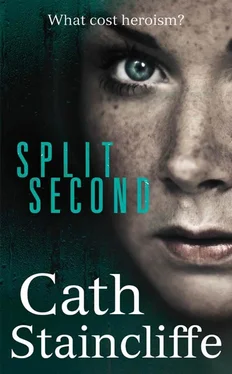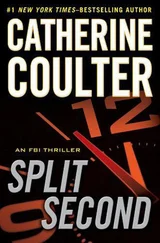Emma had brought in shortbread and handed it round at break.
‘Not stuck poison in it, have you?’ Little Kim teased her. ‘Your face! I thought you were going to kill me.’
‘You should have broken the phone,’ Blonde Kim said to Emma. ‘Vernon would have gone mental.’
‘That beard,’ said Little Kim. ‘Looked a right prat.’
‘Look what I’ve got,’ said Laura. She rummaged in a carrier and pulled out a wodge of holiday brochures. Handed one to each of them. Greek Island Escapes , read Emma’s. Her heart raced. She saw aquamarine sea and white sand, like in the film musical Mamma Mia . Little coves with restaurants by the water’s edge, olives and donkeys. Laura and Emma and the Kims all sunbronzed, drinking chilled wine beneath palm-thatched umbrellas. In their room, getting ready to hit the disco. She knew the three of them had been to Tenerife last year. But now Laura had given her one of the brochures.
‘Be cheaper to book online,’ said Blonde Kim.
‘I know,’ Laura said. ‘This is research. We each come back with two resorts that sound good, decent nightlife and not too far from the airport, and then we choose a shortlist and see what cheap deals we can find on the net. But we need to work out dates. Avoid the school holidays.’
‘I can’t do June,’ said Little Kim. ‘Our Maryanne’s wedding.’
Emma ate another biscuit. She felt the anticipation frothing inside her. They could have barbecues on the beach and go on boat trips. The four of them bessie mates.
‘September’s too long to wait,’ said Blonde Kim.
‘May, then,’ said Laura. ‘Be warm then.’
‘Where are we looking?’ Little Kim tried to see Emma’s brochure.
‘Spain and the Canaries.’ Blonde Kim waved her booklet.
‘Greek islands,’ said Emma.
‘Croatia, Montenegro and Corsica,’ said Laura.
‘And I’ve got Turkey,’ said Little Kim.
‘Will they let us have time off together?’ Emma asked. What if Gavin said no, only three of them could take holiday then?
‘Yeah, if we book it before anyone else, we’ll be okay. So that’s your homework tonight, girls.’ Laura grinned.
Emma looked at the pictures, buildings like sugar cubes, harbour lights at night. She couldn’t wear a bikini, not even a one-piece swimsuit. She could say she hadn’t learnt to swim. But then what about sunbathing? Long shorts would cover the marks, but it would be horrible to get all that way and be by the sea and not be able to go in. She imagined a Victorian bathing suit, long stripy pantaloons and a flouncy skirt. Oh God. If she tried not to do it any more between now and May, then maybe she could explain it, like she had some sort of eczema, or she’d had an accident. Something that left puckered lines and puncture marks criss-crossing her skin on the inside of her thighs.
Who was she kidding? She couldn’t possibly go. But how would she tell Laura? They’d hate her if she turned down the holiday. But they’d hate her even more if they knew how sick she was. She didn’t know what she was going to do.
Louise
Terence had had a fall. Louise found him in the hall when she went to get him washed and dressed and breakfasted. She couldn’t see any obvious signs of injury, but he was very pale and confused. She rang for an ambulance, let the office know, and waited with him till they took him in. She cleared out the perishable food and turned off the heating.
He’d been born in the house and she knew he hoped to die there too, but she didn’t know if he’d come back this time. She’d miss their sparring: he was a dyed-in-the wool royalist who’d voted Tory all his life and liked a good argument. Sometimes it reminded her of the banter when her dad had still been around, arguing with her grandad. When Terence had discovered Louise held her own opposing views, he made a point of engaging her in debate: picking a topic from the Telegraph or the television news and throwing it before her like a gauntlet. ‘Look at that,’ he’d announce. ‘Nanny state gone mad. Kids banned from playing conkers because of health and safety.’
And she’d happily pitch in. ‘It’s not true, another of those urban myths. Very fond of them, the Telegraph .’
‘Never needed health and safety in the old days,’ he’d bluster.
‘That when people were losing limbs at work, chopping their fingers off?’
‘But you can’t deny…’ he’d say, and launch into why immigration was out of control, or they needed to bring back grammar schools or National Service, or how tax by stealth was crippling the nation.
‘Nothing to do with greedy bankers or the world economy taking a dive or the rich robbing us blind, then?’ was Louise’s answer to his economic position. The debate was good-humoured and lively and neither of them ever budged an inch. And when she drew it to a close each time, as she completed his notes so that the next carer could see what was what, he’d slap his hands, large liver-spotted paws, on to his knees and proclaim: ‘We’ll have to agree to disagree.’ She would miss him.
Her next call was a new client, a woman with Parkinson’s who’d had a spell in hospital after a knee replacement and had just been discharged by the rehab team. Louise tried to get to know her a bit while she made and served her lunch and emptied her commode, but the woman was monosyllabic.
Louise did Mrs Coulson’s lunch too, an hour later, and her shopping. Mrs Coulson complained that it was after two o’clock, and Louise reminded her that because there were a limited number of them trying to get round everyone at the same times of day, there was always someone had to be last.
It was a perennial complaint, that and not spending enough time with people. The client often didn’t realize that the office allocated their time slots, and that while Louise might be paid for a half-hour or an hour with a particular client, she wasn’t paid for the travelling time in between house calls.
With the care market carved up and divvied out to the cheapest private contractors, running costs were pared to the bone, wages pegged as low as possible. Looking after the frail and vulnerable was just another business, with people out to make profits.
Louise had a fag after Mrs Coulson. One of Carl’s duty-frees. She leant against her car, collar done up tight. There was a group of little kids on scooters and bikes playing together, Asian most of them, and a couple of white kids. They shouted to each other, excited voices and Mancunian accents ringing in the air. One of them, a little boy with glossy black hair wearing a loose tunic and trousers and an open anorak, suddenly threw down his scooter and started singing and dancing, his arms flashing like semaphore and then his hands on his waist, thrusting his hips like Michael Jackson. A little star. His mates cheered and crowed and Louise laughed.
She remembered Luke’s break-dance phase in the last years of primary school, spinning on his head and flipping back and forth like a contortionist. It was the move to high school when things had really started to sour. It was a tough school, a big comprehensive, and Luke loathed it. It was in his second year that he first got into serious trouble, for hitting another student. When Luke explained, his eyes burning, unable to sit still, that he’d exploded after weeks of low-level bullying – taunts and tricks and having his things ruined – Louise tried to get the school to drop the exclusion. They refused; it was a zero-tolerance offence, though they did give the other kids involved a week’s detention. Luke lost his faith then. Bitter at his treatment and bored senseless by many of the lessons.
One of the little kids yelled, ‘Last one to the corner’s a dumbo,’ and they all swarmed off, pedalling and scooting furiously.
Читать дальше












